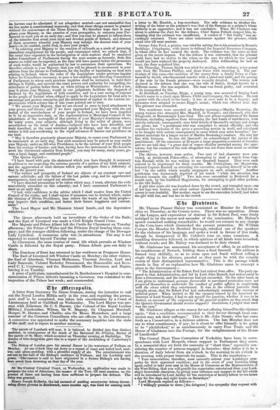Zbe .flgetropolfs.
A letter from Secretary Sir James Graham, stating the intention to call out the Royal London Militia early in the year, and requiring the perma- nent staff to be completed, was taken into consideration by a Court of Lieutenancy held at Guildhall on Wednesday. The Lord Mayor was pre- sent with Aldermen Sir C. S. Hunter, (the Colonel of the Royal London Militia,) Farebrother, Wilson, Sir W. Magnay, Sir Chapman Marshall, Hooper, W. Hunter, and Challis; also Sir Moses Montefiore, and a large number of the Common Councilmen who are officers in the Lieutenancy. A committee was appointed to make the necessary inquiries into the state of the staff, and to report to another meeting.
The parish of Lambeth will now, it is believed, be divided into four distinct parishes, in consequence of the death of the Reverend Dr. D'Oyley, Rector of the parish of St. Mary, which occurred on Thursday evening, at Sunbndge. The demise of this clergyman gave rise to a report of the Archbishop of Canterbury's death.
The Bishop of London gave his annual dinner to the watermen of Fulham on Monday. At one o'clock they sat down to a repast of roast and boiled beef, mut-
st:1:,o:Xciinptlliuemhall of the Bishop's residence at Fulham; ; and his Lords plum-pudding, with a,plentifuel supply of ale. The entertainment was
Lordship said grace. The custom is said to have originated in a former Bishop's son having been saved from drowning on that day of the year.
At the Central Criminal Court, on Wednesday, an application was made to postpone the trial of Johnstone, the master of the Tory, till next sessions, on the ground of there not having been time sufficient to prepare his defence. The delay was granted.
Henry Joseph Kellerby, the lad accused of sending anonymous letters threat- ening divers persons in Southwark, some months ago, was tried for sending such
a letter to Mr. Humble, a hop-merchant. The only evidence to identuy the writing of the letter as the prisoner's was that of the foreman at a printer's where Kellerby is an apprentice; and it was not conclusive. When Mr. Clarkson was about to address the Jury for the defence, Chief Baron Pollock stopped him, in- timating that the evidence was insufficient. A verdict of " Not Gailty " was ac- cordingly returned. There are other indictments against the prisoner, which stand over till next sessions.
George John Ford, a printer, was tried for setting fire to his premises in Bream's Buildings, Cripplegate, with intent to defraud the Imperial Insurance Company, in whose office he had insured the stock. The evidence was the same as that given at the recent inquest. For the defence it was contended, that the prisoner could have had no motive to the crime, as the sum for which he was insured would not have replaced the property destroyed. Alter deliberating for half an hour, the Jury =pitted him.
On Thursday, Thomas Smith was tried for stealing, with violence, a ten-pound note from Mr. Thomas Phillipst and Anne Jones with receiving it. The par- ticulars of this case—the extortion of the money from a family living at Cam- berwell by Smith, who threatened murder with a pistol and knife, and the passing of the note by the female prisoner—were recently detailed. The woman now declared in her defence that she was the wife of Smith, though known by a different name. She was acquitted. The man was found guilty, and sentenced to be trans rted for life.
At Guil 11, on Tuesday, Biggs, a young man, was accused of forging Lord Ducie's name to a check upon Messrs. Child and Company, the bankers. He sent a porter with the check to the bank: it was at once seen to be a forgery; and measures were adopted to secure Biggs's arrest; which was effected next day. The prisoner was remanded.
Two murderers were executed on Monday morning,—Martha Browning, the young woman who strangled Mrs. Mundell, at Newgate; and Quennell, who shot Fitzgerald, at Horsemonger Lane GaoL The new prison-regulations of Sir James Graham, excluding reporters from witnessing the last hours of malefactors, were strictly enforced; consequently, very brief details of Quennell's sayings and doings are given; but " a gentleman who was compelled to attend officially, and who considers the exclusion of the press a proceeding unwise in itself and calculated to be fraught with serious consequences in cases which may arise hereafter," fur- nished materials for a longer record of Martha Browning's conduct. She met her fate with firmness. So also did Quennell: he acknowledged the justice of his punishment. Of the concourse at Newgate a large proportion consisted of females; and we are told that " a great deal of coarse ribaldry prevailed among the spec- tators; but the conduct of the mob altogether was not worse than usual on similar occasions."
The thieves, however, were active. Two men of bad character were con- victed, at Southwark Police-office, of attempting to steal a watch from Cap- tain Randall, while he was waiting to see Quennell hanged. They were each ordered to be imprisoned for three months. Mr. Cottingham, the Magistrate, lectured Captain Randall on attending the execution, exposing himself to be rob- bed " by the rabble which usually congregate on such occasions." Another gentleman was dexterously deprived of his watch " while his attention was directed towards the scaffold." Two lads were committed to Bridewell for a month each, by the Guildhall Magistrates, for attempting to pick other pockets, in the Old Bailey. A girl nine years old was knocked down by the crowd, and trampled upon; one of her legs was broken, and other serious injuries were inflicted ; so that her re- covery is very doubtful. Her mother, eager to see the execution herself, had taken the girl with her, and lost her in the crowd.


























 Previous page
Previous page